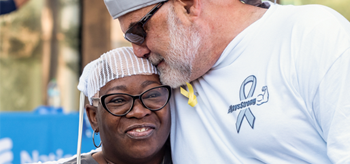The holidays can be particularly challenging for bereaved members of the brain tumor community because of the cultural emphasis on making memories with family, gathering with loved ones, and being thankful and joyful. This time of year can also cause heightened emotions because of the reminder of activities, traditions, and celebrations one may have enjoyed with their loved one.
Use the tips below to help cope with grief this holiday season.
Be kind to yourself.
When you have a milestone event coming up, like significant holidays, birthdays, or anniversaries, it’s important to be kind and gentle with yourself. Give yourself permission to feel however you’re feeling this holiday season, whether it’s sadness, anger, happiness, or a mixture of feelings. Show yourself some grace as you may experience a myriad of emotions during this time of year.
“It’s okay not to smile,” said Holly Gainsboro, who is a Grief Recovery Specialist and facilitates NBTS’s monthly Grief Support group. “It’s okay not to feel happy or overly thankful like so many others around you may be feeling. And you know what else is okay? To smile, to be happy, and to laugh. You can do neither, and you can do both. Joy and sadness can coexist.”
Consider what you want this holiday season.
Take a moment, especially around the holidays, to determine what is best for you, no matter what others may expect from you at this time of year.
Questions to ask as you consider your holiday plans:
- If you’re not going to have the same holiday celebration you did before their passing, what can you do differently to make it unique?
- Would it be helpful to spend time away from home this holiday season?
- Who would you like to spend the holidays with, or would you rather intentionally spend time by yourself this holiday season?
- How can you honor your loved one? What do you think your loved one would like you to do?
- What did your loved one enjoy doing around the holidays that you may want to do or avoid doing this year?
- If you have kids, how would they like to honor your loved one this year? Including them in the plans will give them some sense of control and meaning as the holidays are approaching.
- Can you come up with Plan A and Plan B in case you realize Plan A would be too much to handle?
Create a new ritual.
It may seem impossible to avoid traditional holiday activities, especially if you are a parent of young kids. By creating a ritual, you can foster new memories that won’t force easy comparisons to memories that you previously made with your loved one.
“If you want your kids to have a holiday that your family celebrates, find a way to do that in a way that speaks to you,” Holly said. “A way that honors your family, your memories, and where you are as well.”
Share your intentions with others.
Once you have thoughtfully considered how you would like to handle the holiday season, share your plans with close friends and family. Let them know your intentions for the holidays, especially if they have changed from the annual expectations. Ask them to respect your boundaries and desires for the holiday season and avoid pressuring you to do less or more this year.
If you need to take a year off from traditional family gatherings, say so and try to stand firm in your decision. If you want to try to attend a holiday event, share that you may duck out early if needed. Or you can decide to wait until the day of to determine whether you can join the festivities.
“Just because it’s a holiday doesn’t mean you have to celebrate it or celebrate it the same way you did before your loved one’s passing,” Holly said.
Ask for help.
Stay true to yourself and be honest about what would help you navigate this challenging time of year. As you share your holiday intentions with family and friends, feel empowered to accept or decline any help offered. If there is something you would like help with, take the opportunity to ask during your conversation.
Try to avoid comparisons.
Comparing yourself to others’ holiday experiences can intensify the grief you are already feeling. You may opt to stay off social media during specific periods around the holidays if seeing others experiencing holiday traditions with their families will make you think negatively about how you’re spending the holidays this year.
If the holiday music and decorations of in-person shopping push some buttons for you, take care of your shopping online this year and avoid going into stores.
Acknowledge that the hardest part can be the anticipation.
For many, the anticipation and lead-up to the holiday can be overwhelming and more difficult than the date itself.
“A week before the holiday, they’ll say ‘I can’t do it’ with this anticipatory date coming,” Holly explained. “I see this a lot. I’ve experienced it myself. We can get really tripped up a few days before. Then the day comes, and it’s like, ‘Oh, that was ok.’”
That’s why having a Plan A and a Plan B for a holiday can be beneficial, giving you the flexibility to decide that day which option works best for you.



